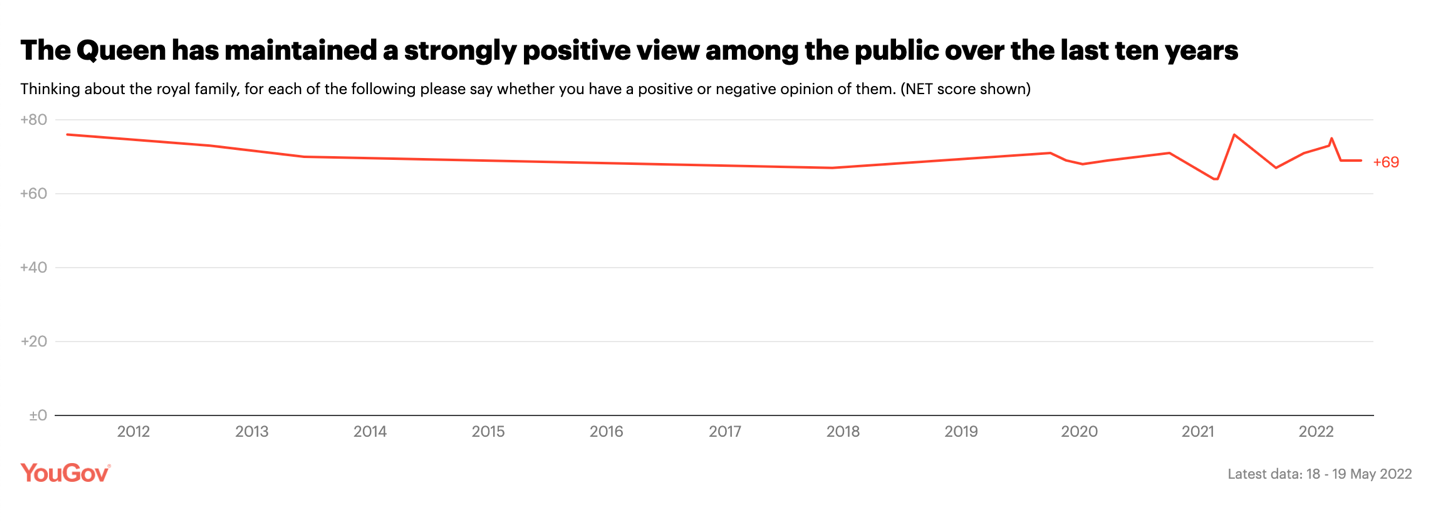Can the Monarchy Keep Calm and Carry On?

The Queen maintained public approval during her reign, but support for the monarchy is on the decline, posing significant challenges for the new King.
The late Queen Elizabeth II was seen as a pillar of stability for an institution considered outdated and deeply flawed by many. As the new King Charles III begins his reign, he faces significant challenges, not only from external critics, but also from within the country—and the royal family itself.

Despite the curious resiliency of modern monarchies, recent YouGov polling raises the question of whether the monarchy can keep calm and carry on. Public support for continuing the monarchy has steadily declined over the last decade, dropping from 75 percent in 2012 to 62 percent this year. Though older Britons have remained steadily loyal to the crown, younger generations are increasingly conflicted, with only 33 percent in support and 31 percent advocating for an elected head of state.
The shift in public favorability doesn’t stop at Britain’s borders. Last November, Barbados removed the queen as its head of state and became the first Commonwealth country to declare itself a republic in three decades. Since then, officials in six Caribbean countries—Belize, the Bahamas, Jamaica, Grenada, Antigua and Barbuda, and St. Kitts and Nevis—have indicated plans to follow suit and opt for independence. These overlapped with two separate visits to the region from British royals, who were met with protests at every stop.
In Jamaica, prominent leaders wrote a letter to the royal family demanding a formal apology and reparations for their role in British colonization and enslavement. These calls to decouple carry deep significance when made by those whose ancestors were victims of the British slave trade. According to Grenada’s ambassador to the Caribbean Community, the global rise of the Black Lives Matter movement has helped spark the “awakening of Black consciousness” in the region. The British monarchy has never formally acknowledged or apologized for the crown’s historical relationship with slavery, and most of the royal family remained silent in the wake of George Floyd’s death in 2020.
The topic of race is not simply an external institutional challenge for the monarchy but also an internal struggle between royal family members. In an interview with Oprah Winfrey last year, Prince Harry and Meghan, the Duchess of Sussex, cited racist remarks from relatives as a primary reason for their departure.
At one point, the public lauded Harry and Meghan’s union as a symbolic shift for the monarchy toward modernization. Their departure from royal duties is just one of many examples highlighting the royal struggle between reinvention and tradition. Shortly after the controversial trips to the Caribbean, Prince William expressed concern over “questions about the past and the future” and shared "feeling[s] in the institution that the monarchy can update itself,” but that change "has to be gradual.” So far, it is unclear whether King Charles III shares that vision or whether, under his reign, this historic institution can progress to meet the demands of the modern world.

In May, public opinion polling indicated a 50-point difference in net favorability for the Queen (69 percent) over Charles (19 percent). Ultimately, the future of the family’s reign could come down to one question: Is Britain a country of Elizabethans or monarchists?

